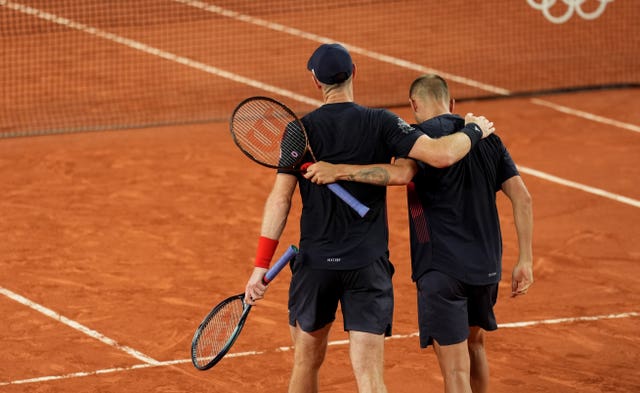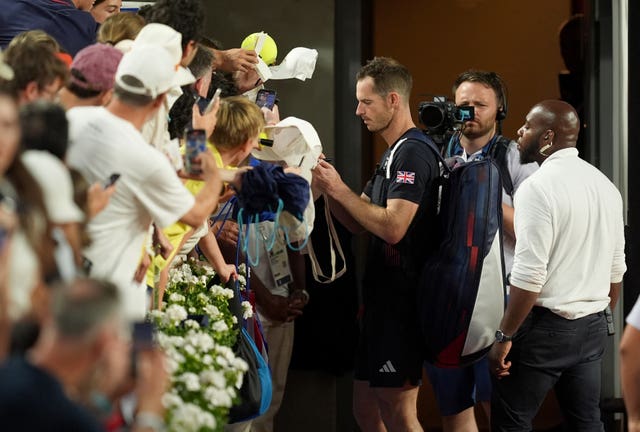Andy Murray glad he could end ‘incredible’ career on his own terms
Murray’s final match was a 6-2 6-4 loss to Taylor Fritz and Tommy Paul alongside Dan Evans at the Olympics.

When the end came, Andy Murray was at peace, ready to call time on his “incredible” career.
After a fitting swansong that saw the Scot and Dan Evans save seven match points in two rounds to battle through to the quarter-finals of the Olympic men’s doubles, their defiance eventually ran out against American third seeds Taylor Fritz and Tommy Paul.
They did manage one last match point save, handing another shot of belief to the flag-waving fans who flocked to Court Suzanne Lenglen hoping for another miracle.
But, with an Evans return that landed just long, a 6-2 6-4 defeat marked the end of one of the great British sporting careers.
Murray and Evans embraced, both with tears in their eyes, before the Scot took the stage alone to cheers of ‘Andy, Andy’, waving to all sides of the court and heading to the exit for the final time.
In typical Murray fashion, he quickly changed his bio on the social media site X to ‘I played tennis’, writing: “Never even liked tennis anyway.”
“I feel good,” said Murray shortly afterwards as lightning lit up Roland Garros. “I’m obviously disappointed with the result tonight and the performance really.
“I’m happy. It’s been a good run here, brilliant final tournament. Obviously it’s not the perfect ending, it would’ve been amazing to have won a medal and we gave it a good go. But I feel good.
“I knew that moment was coming for the last few months. And, if it didn’t happen today, that was going to be in a couple of days’ time and I was ready for it.
“Obviously it was emotional because it’s the last time I will play a competitive match.
“I’m glad I got to go out here at the Olympics and finish on my terms because at times in the last few years that wasn’t a certainty.
“And even a few months ago, I was told when I first went to have my scan on my back that I wouldn’t be playing at the Olympics and I wouldn’t be playing at Wimbledon.
“So I feel also lucky that I got that opportunity to play here and have some great matches, create amazing memories.”
Murray has been battling his body since the hip problems that nearly ended his career five-and-a-half years ago first incapacitated him in 2017.

There were moments of hope, and some notable achievements, but the return to the real top of the game that he craved never arrived and Murray’s frustration with his own limitations and the forcing hand of time reached breaking point.
Arriving at the stage where he was ready to accept the end has been understandably difficult for a man with competitive drive not just at his core but in every fibre of his body.
However, over the past few months, hurried on by an ankle injury and then back surgery, Murray has made peace with the idea it is time for a new phase of his life, revolving initially around his young family and the golf course.
“It’s been really hard,” he said of the effort just to be on court. “Physically, pain-wise, I feel bad. Physically I can obviously go on the court and perform at a level that’s competitive.
“We were close to getting in the medal rounds here.
“That’s OK, but the pain and discomfort in my body is not good and that’s also why I’m happy to be finishing. Because, if I kept going and kept trying, eventually you end up having an injury potentially ending your career. So I know that now is the right time.”
Murray’s love for tennis has been one of the defining characteristics of his career, and it seems inevitable he will find a role back in the sport fairly soon, although what that is remains to be seen.
It was 19 years ago that he burst on to the British sporting scene as a wild-haired teenager with a huge heart, and his resume includes plenty of what ifs as well as the three grand slam titles, world number one ranking and two Olympic gold medals.
Reflecting on the rollercoaster ride, Murray said: “Losing in a grand slam final feels like a huge disappointment but, if I went back to the beginning of my career when I started playing in Scotland, nobody standing here, my family including, none of them would have expected me to do what I did.
“Even when I was 18, 19 years old, there were still a lot of people who doubted my ability, talent, work ethic, mentality, those things.
“It’s been incredible. Obviously, as someone who wants to achieve great things in the sport, I look back at things and there are things I wish I had done differently, but it has been an amazing journey and I have learned a lot of lessons which will help me as a parent, or whatever I do next.”

It was Evans who persuaded Murray to soak up the adulation, with the 34-year-old saying: “I told him at the chair, ‘Get out there’, because what he’s like, he wouldn’t have gone out.
“That’s how he is as a man. He doesn’t want the plaudits. A genuine guy, a generous guy with his time and a top, top human being. It was super emotional, for me as well to be part of it. It’s all over isn’t it.”
British interest at Roland Garros is now at an end, with Katie Boulter and Heather Watson having earlier lost their women’s doubles quarter-final 6-3 6-1 to Italian third seeds Sara Errani and Jasmine Paolini.





